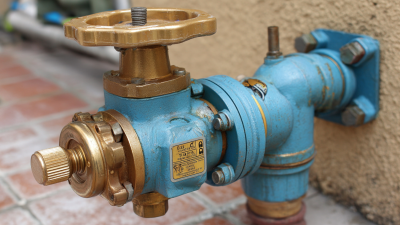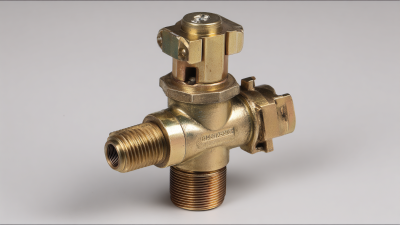
In today's industrial landscape, the demand for efficient and reliable water valve solutions has surged across various sectors, including agriculture, manufacturing, and municipal services. According to a recent report by MarketsandMarkets, the global water valve market is projected to reach USD 80.45 billion by 2026, growing at a CAGR of 5.1% from 2021 to 2026. This growth is driven by the increasing need for water management systems and the implementation of stringent regulations regarding water quality and conservation. Advanced water valve applications are critical in optimizing flow control, reducing waste, and enhancing system performance. As industries continue to prioritize sustainable practices, the evolution of water valve technology becomes paramount in addressing these challenges and ensuring efficient water use across diverse applications.

In today's industrial landscape, the need for efficient water flow control is more prominent than ever. Traditional valve systems often fall short in adaptability and efficiency, leading to increased operational costs and reduced effectiveness in water management. Innovative alternatives, such as smart valves equipped with IoT capabilities, offer a promising solution. These advanced systems not only monitor water flow in real-time but also enable predictive maintenance through data analytics, ensuring optimal performance and minimal downtime.
Moreover, alternatives like pneumatic and electric actuated valves are gaining traction in various sectors, including agricultural, manufacturing, and municipal applications. These valves facilitate precise control over water flow, contributing to enhanced productivity and sustainability. The integration of modern materials and design techniques, such as corrosion-resistant coatings and modular components, further boosts the longevity and reliability of these systems. By adopting these innovative solutions, industries can achieve more efficient water management, reduce waste, and support their commitment to environmental sustainability.
As water management becomes increasingly crucial in the face of climate change and population growth, industries are seeking eco-friendly valve solutions that promote sustainable water use. According to a recent report by the Global Water Resources Association, nearly 25% of the world's population currently faces water scarcity. This alarming statistic underscores the importance of adopting advanced, environmentally friendly water valve technologies to improve efficiency in water distribution and conservation.

One innovative solution involves the integration of smart valve technologies that not only optimize flow rates but also monitor water usage in real-time. A 2022 study by the International Water Management Institute highlighted that implementing such technologies can reduce water loss by up to 40%, significantly impacting resource management across various sectors, from agriculture to urban planning.
Tip: When selecting water valves, consider those made from recyclable materials and designed for longevity to minimize environmental impact. Additionally, investing in automated systems can enhance operational efficiency by providing data insights that enable proactive maintenance and reduced waste.
Moreover, industries are increasingly focusing on sustainable manufacturing practices for water valves. A report by the Environmental Protection Agency indicates that switching to hybrid or electric actuator systems can lead to a reduction of carbon emissions by up to 30%. By embracing these sustainable options, businesses not only fulfill regulatory requirements but also contribute actively to environmental preservation.
Tip: Regularly evaluate your operating systems for energy efficiency and consider retrofitting existing valves with eco-friendly technology to further enhance sustainability efforts.
The integration of smart technology into water valve systems is transforming how industries manage water resources. According to a recent report by the International Water Association, the global market for smart water technologies is projected to reach $29.4 billion by 2026, with a significant portion dedicated to smart valve applications. These advanced water valves are equipped with sensors and IoT connectivity, enabling real-time monitoring and automated control that enhance operational efficiency and reduce wastage.

In manufacturing and agricultural sectors, the adoption of smart valve systems has led to substantial improvements in water management. A study by the World Resources Institute found that smart irrigation systems using automated valves can reduce water usage by up to 30%, optimizing water distribution based on specific crop needs and weather conditions. Furthermore, industries are minimizing downtime and maintenance costs through predictive analytics, an innovation made possible by smart valve technology. As industries continue to seek sustainable solutions, the shift towards intelligent water valve systems will play a pivotal role in achieving resource efficiency and environmental stewardship.
In the realm of commercial water systems, cost-effective valve alternatives are crucial in ensuring operational efficiency and budget management. With rising operational costs and the need for sustainable solutions, many businesses are exploring innovative valve technologies that offer durability without breaking the bank. This shift not only aligns with economic objectives but also emphasizes environmental responsibility, as these alternatives often require less frequent replacement and maintenance.
Advanced materials and manufacturing techniques have led to the emergence of lightweight yet robust valve options that can withstand harsh conditions. These alternatives can provide similar or superior performance when compared to traditional counterparts, making them an attractive choice for industries ranging from agriculture to municipal water management.
By investing in cost-effective valves, companies can reduce downtime and labor costs associated with frequent repairs and replacements, ultimately leading to significant savings in the long term while maintaining the reliability needed for efficient water management systems.
As industries continue to evolve, the demand for advanced water valve technologies is on the rise. Emerging trends suggest a shift towards automation and smart technologies, allowing for enhanced control and efficiency in water management systems. Incorporating IoT (Internet of Things) technology, these advanced valves can provide real-time data and analytics, leading to better decision-making processes and reduced operational costs across various sectors.
Tip: Investing in integrated valve management systems can vastly improve water usage efficiency. By utilizing automated monitoring and control, industries can not only save water but also optimize energy consumption.
Moreover, sustainability is becoming a key factor in water valve design. Manufacturers are focusing on eco-friendly materials and energy-efficient technologies, aligning with global initiatives for environmental protection. These advancements not only benefit the planet but also provide industries with long-term cost savings.
Tip: Prioritize vendors that emphasize sustainability in their water valve products. This not only supports environmental goals but also enhances corporate responsibility.





